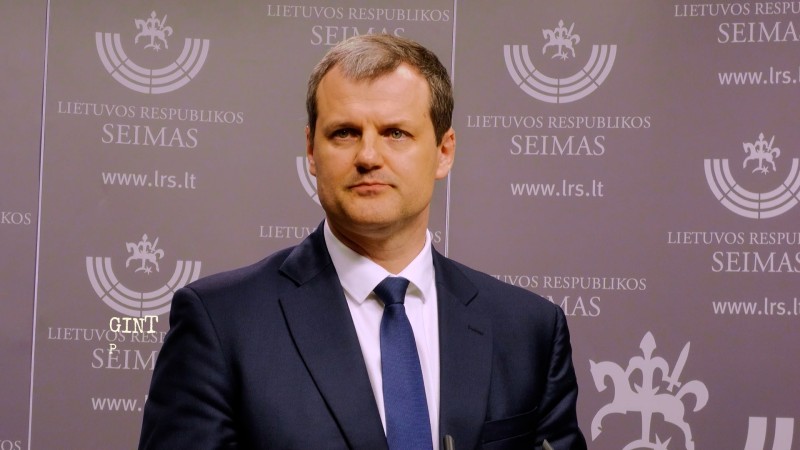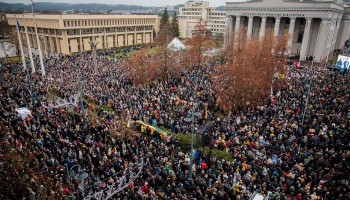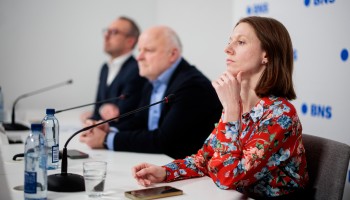Reported by
Lithuanian Prime Minister Gintautas Paluckas is facing growing pressure after a series of investigations linked him to questionable loans, ties to offshore companies, and real estate deals that appear to have personally benefited him—some of which were never declared in official filings, according to investigative reports.
The investigations, published by OCCRP member center Siena and broadcaster Laisvės TV, have triggered criminal and ethics probes, fueled calls for Paluckas’s resignation, and sparked street protests in Vilnius. Around 2,000 demonstrators reportedly gathered in front of Parliament demanding answers from Paluckas—or his resignation.
The first report centered on UAB Garnis, a company co-founded by Paluckas in early 2024. It received a €200,000 ($206,760 at the time) soft loan from ILTE, Lithuania’s state-owned development bank, through a program designed for startups and companies owned by Ukrainian nationals. However, Paluckas already co-owned a company in the same sector that had operated for more than 14 years. The loan prompted an inquiry by the Chief Official Ethics Commission, and the Financial Crime Investigation Service launched a criminal investigation into possible credit fraud.
A second Siena investigation focused on UAB Sagerta, a company Paluckas acquired in 2013 to develop a mobile app for Lithuanian fishermen. Sagerta never turned a profit and went bankrupt, but stayed afloat for years with loans from UAB Uni Trading, a Lithuanian firm with opaque ownership.
Although Uni Trading claimed to be a shareholder in Sagerta, official records listed Paluckas as the sole owner. The company’s financing drew attention when it was revealed Uni Trading had operated from a crumbling building in Vilnius previously linked to UAB Lexie Ventures—then solely owned by Belarusian oligarch Aliaksei Aleksin, now known as “Lukashenko’s tobacco wallet,” and sanctioned by both the EU and U.S.
At the time, Uni Trading was managed by Justinas Klimašauskas, who also served as director of Lexie Ventures. When asked about the loans, Klimašauskas said he was unaware of them. “Were they not repaid?” he asked during a phone call.
Since 2018, Lexie Ventures has been based in the same residential building where Paluckas lived until recently, when he moved to the official prime minister’s residence. The apartment is owned by Marius Giržadas, Aleksin’s business partner and co-owner of Lexie Ventures. Paluckas told Siena his relationship with Giržadas was limited to being neighbors. Giržadas did not respond to requests for comment.
When questioned about the funding and Sagerta’s ownership structure, Paluckas said filing errors may have caused discrepancies in the records. He insisted Uni Trading was a shareholder from the start but claimed not to know who was the end beneficiary of the firm. After the report aired, Paluckas was summoned to Parliament, where he dismissed the reporting as sensationalist, comparing the journalists to “scammers” and invoking “OnlyFans.”
He has since refused to answer further questions from Siena or Laisvės TV—including during official press conferences—insisting all questions be submitted in writing. In early July, Lithuania’s Special Investigation Service, the national anti-corruption agency, opened a second criminal probe into Paluckas’s financial affairs.
The second Siena and Laisvės TV report, published in late June, also examined a €6 million ($7.03 million) municipal purchase in 2018, when Paluckas was deputy mayor of Vilnius. The city voted to buy the Soviet-era Palace of Labor Unions from a company tied to Darijus Vilčinskas—a longtime friend of Paluckas and behind-the-scenes backer of Sagerta.
Vilčinskas also represented Uni Trading, the company that financed Sagerta and had run another firm that, in 2013, sold Paluckas a luxury apartment. None of these ties appeared in Paluckas’s official asset declarations when he ran for mayor in 2015.
In a written response, Paluckas dismissed the investigation as “far-fetched” and said the apartment purchase was funded through personal and borrowed money. He denied any conflict of interest in the municipal vote, and told the media he never had a formal business relationship with Vilčinskas. He later said he retains the confidence of Parliament and would discuss the matter further with the president.
Vilčinskas initially denied having business ties with Paluckas, saying he simply represented investor interests. But later, in an interview with Lithuania’s business daily Verslo Žinios, he reversed course, admitting to investing in Sagerta. “I have no relationship with the Lithuanian Prime Minister. But with Mr. Paluckas, we've been friends for over 15 years, and that’s no secret,” he told Siena in June.
Now, Siena and Laisvės TV have uncovered another questionable property deal. In 2012, Paluckas bought a 49-square-meter apartment in Vilnius’s central business district for just €16,500 ($21,362) from Grafdec Limited, a now-dissolved Cyprus-based firm. The same property had been purchased by Grafdec for €107,000 ($125,243) in 2008—meaning Paluckas paid just €366 ($473) per square meter.
Grafdec’s principal shareholder at the time was Conmile Holding Limited, a Bahamas-registered company with no publicly declared beneficiaries. The building, constructed in 1940, was poorly maintained, and it remains unclear where Paluckas actually lived between 2011—when he sold his previous flat—and 2013, when he was living in the luxury apartment.
Despite growing public criticism and falling approval ratings, Paluckas has rejected calls to step down, maintaining he broke no laws. He kept the same course even after the Lithuanian president Gitanas Nausėda urged him to stop dodging questions.
“There are no bad questions – there are improper answers. These answers cause doubts, because they don’t exactly match the answers presented [by the prime minister] previously. I’d like to wish the Prime Minister to tell the truth and truth only, because we’re talking about trust. The reputation of all of us, all politicians, including myself, is about trust. If that trust is lost, it becomes very difficult for a politician to do his job,” the president said.




